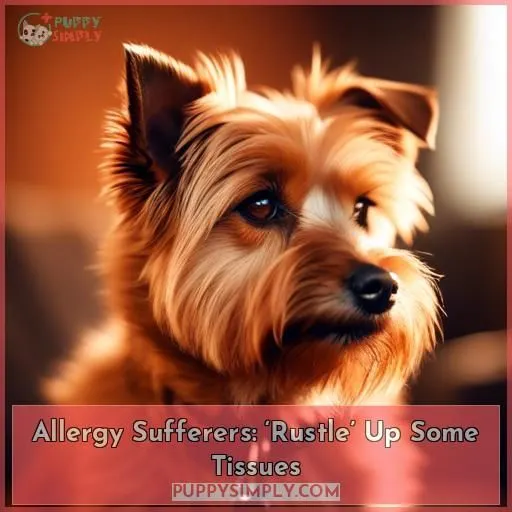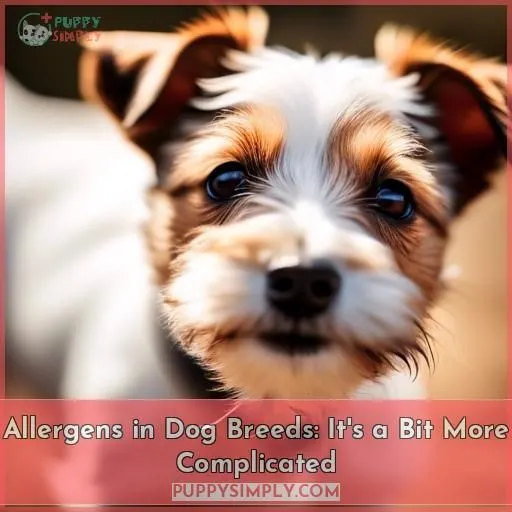This site is supported by our readers. We may earn a commission, at no cost to you, if you purchase through links.
 Imagine a dog untainted by allergens, a furry friend that doesn’t trigger sniffles and sneezes.
Imagine a dog untainted by allergens, a furry friend that doesn’t trigger sniffles and sneezes.
But are Jack Russell Terriers truly hypoallergenic?
This guide deciphers the truth about these lively pups’ impact on allergies.
Dissecting the root causes of pet allergies.
Exploring grooming techniques.
Comparing hypoallergenic breeds.
You’ll gain insights to make an informed decision.
Embrace a life with a loyal companion, sans the dreaded allergy woes.
Table Of Contents
- Key Takeaways
- Are Jack Russell Terriers Hypoallergenic?
- What Causes Dog Allergies?
- So, Are Jack Russell Terriers Hypoallergenic?
- What if You Have Allergies and Want a Jack Russell Terrier?
- Which Breeds Are a Solid Choice for Allergy Sufferers?
- Allergy Sufferers: ‘Rustle’ Up Some Tissues
- How Are Hypoallergenic Dog Breeds Classified?
- The 22 Hypoallergenic Dog Breeds
- Understanding Hypoallergenic Dogs
- Jack Russell Terrier Characteristics: More Than Just a Cute Face
- Allergens in Dog Breeds: It’s a Bit More Complicated
- Frequently Asked Questions (FAQs)
- What is the difference between hypoallergenic and allergy-proof dogs?
- How does the Jack Russell Terrier’s coat type affect allergen levels?
- Can Jack Russell Terriers be a suitable choice for allergy sufferers?
- What are some alternative breeds for allergy sufferers?
- How does grooming play a role in managing allergies with a Jack Russell Terrier?
- Conclusion
Key Takeaways
- Jack Russell Terriers are not hypoallergenic, as they shed and produce dander, which can trigger allergic reactions in people with sensitivities to these allergens.
- Some Jack Russell Terriers may be more suitable for allergy sufferers due to their short, wiry coats, which can trap fewer allergens compared to longer-haired breeds.
- If you’re considering getting a Jack Russell Terrier despite your allergies, it’s advisable to spend time with the dog before committing, as individual reactions to dogs vary.
- Alternative breeds for allergy sufferers include Miniature Poodles, Jack-a-Poos, Yorkshire Terriers, Bedlington Terriers, and Bichon Frises, which are known for their low-shedding coats and reduced allergen production.
Are Jack Russell Terriers Hypoallergenic?
No, Jack Russell Terriers are not hypoallergenic. They shed and produce allergens like dander, saliva, and urine, which can trigger allergic reactions in some individuals. However, some Jack Russell Terriers may have lower-shedding coats, which can be a better choice for people with mild-to-moderate allergies.
It’s essential to consider individual factors, grooming practices, and lifestyle adjustments when determining the compatibility between Jack Russell Terriers and allergy-prone individuals.
What Causes Dog Allergies?
Dog allergies result from proteins found in dander, which is dead skin cells that attach to dog hair. Saliva and urine also contain allergens that can trigger reactions in sensitive individuals.
Dander
Dander is a key culprit in dog allergies. It’s essentially dead skin cells from your furry friend that attach to their hair.
To manage dander, consider non-shedding or hairless breeds like Jack Russell Terriers. While they’re not hypoallergenic, their smooth or rough coats can help reduce dander.
Regular grooming and clean living spaces also play a role in controlling dander levels.
saliva
Dog saliva, like dander and urine, is packed with proteins that can trigger allergies.
Contrary to popular belief, it’s not the fur but these proteins in saliva that often lead to sneezes and itchy eyes.
Even the charming Jack Russell Terrier isn’t hypoallergenic, despite its spirited personality.
Expert opinions confirm, managing allergies means understanding these invisible culprits lurking in every lick.
and urine contain allergens.
What Causes Dog Allergies?
Dog allergies are triggered by proteins in saliva, urine, and dander. These allergens aren’t just in fur, but also in dander, which is made up of dead skin cells that attach to dog hair. Non-shedding and hairless dogs are often recommended for allergy sufferers, as they produce fewer allergens. However, it’s important to note that no dog is completely allergen-free, and individual reactions to dogs vary.
So, Are Jack Russell Terriers Hypoallergenic?
Are Jack Russell Terriers Hypoallergenic?
The short answer is no, Jack Russell Terriers aren’t hypoallergenic. They shed and produce dander, which can trigger allergic reactions in people with sensitivities to these allergens. However, some Jack Russell Terriers may be more suitable for allergy sufferers due to their short, wiry coat, which can trap less allergens compared to longer-haired breeds.
Shedding and Wire-haired Jack Russells
Jack Russell Terriers shed, and while different varieties have varying levels of shedding, none of them are completely hypoallergenic. The wire-haired Jack Russell Terrier, for example, has a coat that can trap less allergens, making it a better choice for some allergy sufferers.
Test Run and Management
If you’re considering getting a Jack Russell Terrier despite your allergies, it’s advisable to spend time with the dog before committing. This can help you assess your allergic reactions and determine if the breed is suitable for you. Additionally, managing allergies with a Jack Russell Terrier involves regular grooming, maintaining clean living spaces, and possibly using allergy prevention measures.
Alternative Breeds for Allergy Sufferers
If you’re looking for a dog breed that’s more hypoallergenic, consider breeds like the Miniature Poodle, Jack-a-Poo, Yorkshire Terrier, Bedlington Terrier, or Bichon Frise. These breeds are known for their low-shedding coats and reduced allergen production.
Hypoallergenic Myths and Facts
It’s important to understand that no dog breed is completely hypoallergenic. Even breeds like Jack Russell Terriers, which are often considered low-shedding, can still produce dander that can trigger allergies and asthma in susceptible individuals.
What if You Have Allergies and Want a Jack Russell Terrier?
If you have allergies and are considering getting a Jack Russell Terrier, it’s essential to manage your allergies effectively.
- Test run: Before committing to a Jack Russell Terrier, try pet sitting or fostering one to see if the breed triggers your allergies.
- Invest in a robot vacuum cleaner: Regular vacuuming is crucial for allergy management. A robot vacuum cleaner can help keep your home clean without exposing you to allergens.
- Wear protective gear: When emptying the robot vacuum cleaner’s filter, wear protective gear to minimize your exposure to allergens.
- Brush daily: Daily brushing with a wire-bristle slicker brush can help remove loose hair and reduce allergens in your home.
- Give fish oil supplements: Omega-3 fatty acids can help alleviate skin allergies in dogs. Consult with your vet to determine the appropriate dosage for your Jack Russell Terrier.
- Feed high-quality dog food: A balanced diet can help manage allergies in dogs. Choose high-quality dog food and ensure your Jack Russell Terrier isn’t consuming any allergenic ingredients.
- Train your pet: Teach your Jack Russell Terrier to stay off furniture and out of the bedroom to minimize allergen exposure.
- Consider lifestyle changes: You may need to make some adjustments in your home to accommodate your Jack Russell Terrier and manage your allergies.
Which Breeds Are a Solid Choice for Allergy Sufferers?
If you’re an allergy sufferer looking for a furry companion, you might be wondering which breeds are a solid choice for you. While no dog is completely allergen-free, there are breeds that produce fewer allergens than others.
- Miniature Poodle: Known for their curly, low-shedding coat, poodles are a popular choice for those with allergies. However, it’s important to note that even poodles can cause allergic reactions, so it’s crucial to spend time with one before committing.
- Jack-a-Poo: A mix between a Jack Russell Terrier and a Poodle, Jack-a-Poo can be a low-shedding, hypoallergenic alternative.
- Bichon Frise: This breed is known for its low-shedding, non-allergenic coat.
Allergy Sufferers: ‘Rustle’ Up Some Tissues
If you’re eyeing a Jack Russell Terrier but your sinuses scream no way, you’re not alone. Allergies can turn the dream of pet adoption into a sneezy reality. Yet, with savvy allergy management and smart breed selection, you can still find your furry soulmate.
Remember, hypoallergenic options do exist, but Jack Russells, with their can f 1 and can f 2 proteins lurking in dander and saliva, mightn’t be the ticket.
| Factor | Jack Russell Terriers | Hypoallergenic Breeds |
|---|---|---|
| Allergic Reactions | ||
| High | Lower | |
| Pet Adoption | Challenge | Easier |
| Allergy Management | ||
| Intensive | Manageable | |
| Breed Selection | Careful | Broader |
| Proteins (Can f 1 & 2) | Present | Minimized |
Choosing a pet is like picking a roommate; compatibility is key. Don’t let allergies derail your dreams; explore, ask, and maybe sniff around a bit.
How Are Hypoallergenic Dog Breeds Classified?
When it comes to hypoallergenic dog breeds, there are a few key factors that determine their classification. These factors include coat type, shedding tendencies, and reduced production of dander.
- Coat Type: Dogs with curly or wiry hair are considered hypoallergenic because their coat textures trap allergens closer to the dog’s body, making them less likely to cause allergic reactions. For example, the Poodle’s curly hair helps trap allergens, while the Schnauzer’s wiry topcoat and soft undercoat rarely shed.
- Shedding Tendencies: Low-shedding breeds are more likely to be classified as hypoallergenic. Breeds like the Bichon Frise and the Soft Coated Wheaten Terrier produce little dander due to their low-shedding coats.
- Reduced Production of Dander: Hypoallergenic breeds typically produce fewer allergens than other breeds. This is because they’ve a reduced amount of dander, which is a common allergen found in dog fur. For example, the Xoloitzcuintli Mexican hairless dog is considered hypoallergenic because it has a hairless variety that produces less dander.
The 22 Hypoallergenic Dog Breeds
Let’s explore a list of 22 hypoallergenic dog breeds that are known for their low-shedding coats and reduced allergen levels, including the popular Poodle, Afghan Hound, Airedale Terrier, Portuguese Water Dog, and Bergamasco.
These breeds offer a great option for allergy sufferers who still long for the companionship of a furry friend.
Poodle
Poodles are known for their low-shedding, curly coats, making them an excellent choice for allergy sufferers.
They come in three sizes: toy, miniature, and standard.
Grooming is crucial for maintaining their coats and reducing allergens.
Poodles are hypoallergenic, but individual reactions to them may vary.
If you’re considering a Poodle, it’s essential to spend time with them before committing.
Regular grooming, a clean living space, and proper management can help minimize allergens.
Afghan Hound
After diving into the poodle’s charm, let’s leap into the world of the Afghan Hound.
- Unmatched elegance and grace, making heads turn.
- Silky, hypoallergenic coat that’s a dream for allergy sufferers.
- Fiercely independent streak, often playing hard to get.
- Aloof demeanor, offering a serene presence unlike the lively Jack Russell Terrier.
This breed is a majestic choice for those dodging allergies and seeking a dignified companion.
Airedale Terrier
The Airedale Terrier, often referred to as the King of Terriers, is a versatile breed known for its intelligence, loyalty, and playful personality. While they aren’t hypoallergenic, they’re a popular choice for allergy sufferers due to their low-shedding coat and relatively low allergen levels compared to other breeds. Airedales have a wiry, dense coat that’s designed to protect them from harsh weather conditions and provide insulation. They require regular grooming to keep their coat in good condition, which can help manage shedding and keep homes clean.
Airedale Terriers come in three different coat types: smooth, broken, and wiry. The smooth coat is the least common and is short and straight. The broken coat is a mix of long and short hairs, while the wiry coat is the most common and is dense and curly. The wiry coat is the most hypoallergenic, as it traps the hair that falls until it’s brushed out, reducing the amount of loose hair in the environment.
Airedales are a medium-sized breed, typically weighing between 50 and 70 pounds and standing 23 inches at the shoulder. They’ve a high energy level and require daily exercise to keep their exuberant personalities in check. They’re also known for their strong protective instincts and make excellent watchdogs.
When it comes to allergy sufferers, the Airedale Terrier’s low-shedding coat and relatively low allergen levels make them a suitable choice. However, as with any breed, individual reactions to dogs can vary, and it’s essential to spend time with an Airedale Terrier before committing to ownership. Regular grooming, maintaining clean living spaces, and managing their exercise and mental stimulation are crucial for allergy sufferers to minimize allergen exposure.
Portuguese Water Dog
If you’re considering a Portuguese Water Dog as a hypoallergenic breed, it’s essential to understand their grooming needs.
These dogs have a double coat that requires regular brushing to prevent matting and tangles.
They also shed less than other breeds, making them a suitable choice for allergy sufferers.
However, they still produce allergens, so it’s crucial to maintain a clean living space and practice good hygiene.
Additionally, training and socialization are essential for their temperament, which is known for being friendly and intelligent.
Bergamasco
The Bergamasco is an ancient Italian breed known for its unique, low-maintenance coat.
This hypoallergenic pup boasts a versatile nature, making it a great choice for allergy-prone families.
With its locks of hair, fur, and wool, the Bergamasco requires minimal brushing, similar to hairless breeds like the Yorkshire Terrier or American Hairless Terrier.
Its adaptable temperament and hypoallergenic qualities make the Bergamasco a compelling option for those seeking a furry companion.
Understanding Hypoallergenic Dogs
When it comes to living with a dog, allergy sufferers face a unique challenge. Non-shedding dogs, like the Parson Russell terrier, can be a good choice for those with allergies. This breed has a smooth, double coat and sheds moderately year-round, with heavier shedding in spring and fall. However, the Russell terrier, with its smooth or rough coat, isn’t hypoallergenic.
Managing allergies with a dog requires a bit of effort. Testing a dog’s compatibility with your allergies can be done by pet sitting or fostering a wire-haired Jack Russell Terrier. Regular grooming, such as daily brushing with a wire-bristle slicker brush, is essential to control allergen exposure. Additionally, fish oil supplements can help reduce allergic reactions. Feeding high-quality dog food and training your dog to stay off furniture and out of the bedroom can also help.
For those who can’t tolerate a Jack Russell Terrier, alternative breeds like the Miniature poodle, Jack-a-Poo, Yorkshire terrier, Bedlington terrier, and Bichon frise are options. These breeds have low-shedding coats and produce fewer allergens than non-hypoallergenic breeds. However, even hypoallergenic breeds aren’t allergen-free and require regular grooming to remove loose hair.
In the realm of hypoallergenic dogs, it’s not merely about eliminating allergens, but reducing exposure. The world of hypoallergenic dogs is ever-evolving, and it’s advisable to navigate the complexities with patience and understanding.
Jack Russell Terrier Characteristics: More Than Just a Cute Face
If you’re considering a Jack Russell Terrier but have allergies, it’s essential to understand their traits beyond their adorable faces. Jack Russell Terriers are known for their energy, intelligence, and charm. They typically have a smooth or rough double coat, but the short fur doesn’t automatically make them hypoallergenic. Allergens are released through dander, saliva, and urine, which can trigger reactions.
However, individual reactions to Jack Russell Terriers vary. Some people may tolerate them, while others may experience allergies. To manage allergies, regular grooming is crucial for allergen control. Maintaining clean living spaces and considering lifestyle adjustments can also help reduce allergens.
While Jack Russell Terriers may not be hypoallergenic, they can still be suitable for some allergy sufferers with proper management. It’s all about finding the right balance and understanding the complexities of allergies in the realm of dogs.
Allergens in Dog Breeds: It’s a Bit More Complicated
Allergies in dogs are caused by proteins in dander, saliva, and urine. These allergens can trigger an immune response, leading to symptoms like sneezing, itching, and skin irritation. While some breeds are known to be hypoallergenic, such as Miniature Schnauzers, it’s essential to understand that no breed is completely allergen-free. Even non-hypoallergenic breeds like Jack Russell Terriers can be suitable for allergy sufferers with proper management.
Here are three key points to consider when dealing with allergens in dogs:
- Dander Composition: Dander is made up of dead skin cells that attach to dog hair. Non-shedding and hairless dogs, like the Miniature Schnauzer and Lagotto Romagnolo, are often recommended for allergy sufferers as they produce less dander.
- Saliva Proteins: Proteins in a dog’s saliva can also cause allergic reactions. Some breeds, like the Maltese, may be more prone to developing allergies due to their smaller size and increased sensitivity.
- Urine Allergens: Allergens in urine can also contribute to allergic reactions. Hypoallergenic breeds like the Puli and Löwchen have a lower likelihood of triggering allergies, but they still require regular grooming to remove loose hair and control allergens.
For allergy sufferers considering a Jack Russell Terrier, it’s crucial to remember that individual reactions to dogs vary. Some individuals may tolerate Jack Russell Terriers, while others may experience allergies. To manage allergies with a Jack Russell Terrier, consider the following tips:
- Test Run: Spend time with a Jack Russell Terrier before committing to ownership.
- Regular Grooming: Brush daily with a wire-bristle slicker brush to remove loose hair and allergens.
- Fish Oil Supplements: Give fish oil supplements to support skin health and reduce inflammation.
- High-Quality Dog Food: Feed a high-quality diet and train your dog to stay off furniture and out of the bedroom to minimize exposure to allergens.
Alternative breeds for allergy sufferers include the Miniature Poodle, Jack-a-Poo, Yorkshire Terrier, Bedlington Terrier, and Bichon Frise. These breeds are known for their low-shedding coats and minimal allergens in dander, hair, and saliva.
In conclusion, while no breed is completely allergen-free, hypoallergenic breeds like the Miniature Schnauzer and Puli can help reduce allergen exposure. Proper management, including regular grooming, clean living spaces, and lifestyle adjustments, can also make living with a Jack Russell Terrier more comfortable for allergy sufferers.
Frequently Asked Questions (FAQs)
What is the difference between hypoallergenic and allergy-proof dogs?
Hypoallergenic dogs have low-allergen coats, but no dog is truly allergy-proof. Individual reactions vary – spend time with a potential pet first.
How does the Jack Russell Terrier’s coat type affect allergen levels?
Roughly 40% of Jack Russell Terriers have a rough coat that traps more dander and allergens. The smooth coat variety sheds moderately, releasing allergens into the environment.
Can Jack Russell Terriers be a suitable choice for allergy sufferers?
Jack Russell Terriers aren’t truly hypoallergenic, but their coats could help manage allergies if groomed properly.
What are some alternative breeds for allergy sufferers?
Alternatives like Miniature Poodles, Jack-a-Poos, Yorkies, Bedlington Terriers, and Bichons Frises shed less and produce fewer allergens—perfect for allergy sufferers!
How does grooming play a role in managing allergies with a Jack Russell Terrier?
In your battle against allergies, grooming is key – brushing regularly will remove loose hair and dander, reducing irritants.
Conclusion
Diligently decoding dog dander’s dilemma demands discernment. Despite delightful demeanors, Jack Russell Terriers aren’t hypoallergenic. Yet, you can coexist comfortably with conscientious care. Conduct comparative research, consult experts, and consider alternative breeds fitter for allergy sufferers.
Cherish canine companionship by carefully curating conditions conducive to comfortable cohabitation.
















